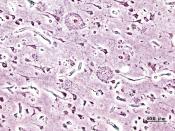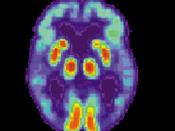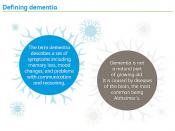Actually it's a report which was completed for OAC English Excellent
THE RESULTS OF AGING
Prepared for
Ms. Ferguson
by
Mark Trolley
Abstract
This report presents several aspects of aging. The report looks at a number of theories of why we
age, the physical and mental changes we undergo as we age, and several ways of caring for the
elderly.
March 7, 1997
TABLE OF CONTENTS
LIST OF ILLUSTRATIONS.....iii
INTRODUCTION..............1
THEORIES OF WHY WE AGE....2
Genetics.............2
Cellular.............2
Physiological........2
PHYSICAL CHANGES..........2
MENTAL CHANGES............5
Alzheimer's Disease..5
Senile Dementia......5
CARING FOR THE OLD........6
Retirement Communities..6
Life-care Facilities....6
House Sharing...........6
Group Homes.............7
Low-cost, Government Subsidized Housing..7
Foster Care..............................7
Nursing Homes............................7
CONCLUSIONS...............9
WORKS ....................10
LIST OF ILLUSTRATIONS
Tables
1. The results of aging.....................................................................................................................4
INTRODUCTION
The purpose of this report is to discuss several aspects of aging.
Several theories of why we age, based on genetic research, cellular research, and
physiological research will be examined, along with physical and mental changes that are the result
of aging.
Specific mental changes that will be explored are Alzheimer's Disease and Senile
Dementia. The final aspect to be looked at will be the care of the elderly in retirement
communities, life-care facilities, house sharing, group homes, low-cost government subsidized
housing, foster care, and nursing homes.
THEORIES OF WHY WE AGE
Since research into aging is not guided by any one universally accepted theory, genetic,
cellular, and physiological studies have yielded several hypotheses.
Genetics
The most popular genetic theory, the Error Theory, assumes that aging is the result of the
accumulation of random genetic damage, or from small errors in the flow of genetic information.
The damage or errors would reduce or prevent proper cell function.
Cellular
The best known theory of aging in cellular research is called the Hayflick Effect, which is
named after the American microbiologist...


